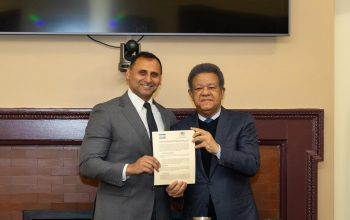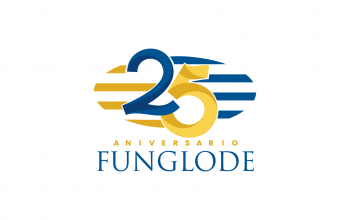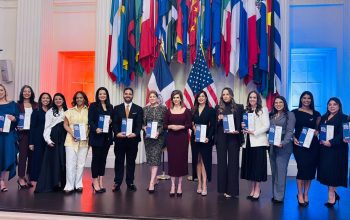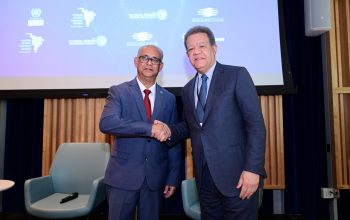news
Funglode / GFDD 2014 Awards Winners Announced
December 7, 2014
500 Entries Were Submitted in This Eighth Edition, in Seven Categories. The Announcement Was Made at the Art Gallery of Funglode.
Global Foundation for Democracy and Development Global (GFDD) and Fundación Global Democracia y Desarrollo (Funglode), through its Cultural Studies Center, announces the results of the eighth edition of its Annual Awards for Literature, Journalism, Photography and Audiovisual for the year
2014 after the evaluation by different juries.
The announcement of the winners was made by Catherine Florentino, Director of Funglode / GFDD Awards; the Director of the newspaper El Día, Rafael Molina Morillo, and the poet and essayist Basilio Belliard-both juries for the awards- in the presence of the Notary Lawyer Danitza Felix.
A total of 500 entries were submitted by category this year: 199 in short stories;
18 in novels; 45 in poetries; 21 in journalism and 13 in essays. In the photography category there were 199 proposals: 92 in color; 76 in black and white and 31 in creative digital. Likewise, five works were submitted in the category of documentary.
 The winners in the first three places in almost every category
The winners in the first three places in almost every category
will receive cash prizes, ranging from RD $25,000.00 up to RD $150,000.00. The award ceremony will take place in February 2015.
In addition to prize money, the works submitted in the categories of novel, poetry, journalism, essays and short stories will be published by Editorial Funglode.
PEDRO MIR POETRY AWARD
First Place: "Anversos" César Augusto Zapata, Pen Name Desconocido Pérez.
Verdict:
"For its outstanding aesthetic values, which have well achieved a symbiosis of tradition and poetic art. On one hand, it shows in long-term strategy, thematic coherence on a rate of preferably transparent and harmonic imaging, while it does not
detracts from the use of resources contrasts and paradoxes, from the creation of neologisms, i.e. constructions and linguistic distortions that seek to impact the sensitivity of the readers with ideas summarized in one line. The title of this collection of poems, "Anversos" is loaded with symbolism, on the obvious reference to the literary genre (the "Verses"); it also proposes a two-way relationship of contradiction and adds: Front-Back, ie, both sides
of a flat object. It is precisely what makes the book divided into halves: one, The Love of the Lost, and two, The Lost love.
Jurors:
León Félix Batista, León David, Fernando Cabrera
JUAN BOSCH SHORT STORY AWARD
First Place: “Con la misma moneda”
Authored by Vladimir Tatis
Pérez, Pen Name Monkey Blac
(“For the strength of a story narrated with literary skills and good command of language”).
Second Place: “Serás para mí”
Keiselim authored by Keiselim A. Montás, Pen Name El Hijo de Doña Tatica.
("For its good handling of storytelling, with a suggestive treatment
of the psychology of the characters").
Third Place: "El último crepúsculo de Manuel Sangremezclada"
Authored by Olivier Lemaire Batista, Pen Name Caonabo.
("For its excellent setting of the epoch, its successful use of language and skill in the handling of situations”).
HONORABLE
MENTIONS:
"Morder la sonrisa, Boris" by José Beltrán Frías, Pen Name Lobo Hombre
"El relojero de Zúrich" Omar Mesón, Pen Name Arquímedes
“Nouvelle (la circuncisión de Lucifer)”, by José Fernández Caminero, Pen Name Demetrio
Rodriguez
Jurors:
Armando Almánzar, Emilia Pereyra, Pedro Antonio Valdez.
FEDERICO GARCIA GODOY NOVEL AWARD
First Place (Vacant)
Runners-Up:
“La vida y los tiempos”, by Rafael Antonio Tejada, Pen Name Alfa.
“El pingüino rojo”, by Jesús Leonardo D’ Alessandro
Martínez, Pen Name Pedro Cocolo.
Jurors:
Marcio Veloz Maggiolo, Rafael García Romero, René Rodríguez Soriano.
PEDRO FRANCISCO BONÓ ESSAY AWARD
First Place: "El poder de la técnica: la estructura narrativa de la novela ‘Solo cenizas hallarás
(Bolero)”.
Authored by: Fernando Alberto Berroa Aquino, Pen Name Dr. Bloom Barthes
Verdict:
("It’s a thoughtful analysis, documented and judiciously focused. Possibly, until now, no analyst of this novel has penetrated both the interiority of his characters, nor the technical resources employed by Pedro Vergés to arm his work. This is a rigorous and original essay, that
it utilizes a methodology of textual analysis from the structural foundations of the genre’s own novel. Its narrative is modern; it highlights the use of interior monologue, the hidden data, and intertextuality, the management of the narrative plot, tone and internal structure of the novel. The author or author relies on a voluminous and very adequate bibliography on literary theory and criticism, and history of Dominican and Latin American literature ".)
Second Place: " La filosofía, ¿qué es y para qué sirve?" Ángel P. Polacio T, Pen Name, Paulino Polanco y Erlanga.
("Although written in simple and free of artifice style, its text is one of sober content. This essay connects the deeper aspects of philosophy, history and science with everyday matters, bringing philosophy to the scope of readers that
are not well documented in this matter. Write with freshness and ease and risks in their arguments and properly handles the philosophical concepts, in particular, epistemology, philosophy of science and the history of philosophy. ").
Third Place: “El discurso, una herramienta de poder”, by Melania Pérez Florentino, Pen Name La voz.
(“Expressive clarity, good command of syntax and
freedom of ideas predominates in this essay. The author or authors establishes the different levels of discourse and communicative power of this tool, according to the intent of the sender, achieving this goal proposed: to persuade the receiver. It is a model of discourse analysis from the conceptions of Teun Van Dijk on this matter, who favors the critical discourse analysis based on ethnicity and cultural identity. It has a linguistic approach that studies the speech as a weapon of power
in the hands of the user of a specific language”).
Jurors:
Basilio Belliard, Franklin Gutiérrez, Manuel Núñez.
RAFAEL HERRERA JOURNALISM AWARD
First Place: “La colonia china en República Dominicana”
Authored by: Javier Valdivia Olachee (Listín
Diario).
(“An excellent story in four parts that reflect a rigorous historical research on one of the oldest foreign colonies settled in the country, renowned for its great diligence and entrepreneurial spirit made manifest through multiple businesses, especially in the commercial field. The work delves into the beginnings of Chinese immigration and summarizes its further development until today, also reflecting the features and rooted cultural habits that
this community maintained without prejudice to its integration in the host country. It should be noted the qualified sources of information attended by the author: two distinguished Dominican historians of Chinese origin, Mu-kien Adriana Sang Ben and José Chez Checo and Rosa Ng Báez, commercial representative of the RD to the People’s Republic China”)
Second Place: “Juan Santiago, el pueblo del
olvido”.
Authored by: Yinett Santelises (Diario Libre).
(“Interesting series of successive reports that capture the reader’s interest, about which the author identifies as "the poorest municipality in the country," Juan Santiago, located in the border province of Elías Piña. The testimony of several archetypes of its inhabitants-its social exclusion, poor living
conditions, the daily challenge subsistence taken to its most precarious limits, charging his frustrated dreams and aspirations of a more dignified life, gives you a deep human monotone content to interesting journalistic work, and is a reflection of many other forgotten communities in the country that treasure misery and despair that unfolds the existence of a large number of Dominicans”).
Third Place: “Madres
adolescentes”.
Authored by: Saiury Calcaño Rodríguez and Francis de la Cruz (Listín Diario).
(“A very comprehensive and detailed overview that allows a broad view of the causes and consequences of this great social and human problem, which makes the RD in one of the countries in the world where there is greater prevalence. The various reasons, often financial, are also a reflection of
the crisis of the family institution, lack of guidance within the home and a system of adequate sex education in school”).
Special Mentions:
“Los de Allá/ Special Series”, by Indhira Suero Acosta (Listín Diario).
“Los feminicidas, by Wanda Méndez and Doris Pantaleón (Listín
Diario).
“Contrabando de carbón en la frontera”, by Kirsis Díaz (Diario Libre).
“Adictos a las drogas”, by Ana Lisania Batista Mateo (Diario Libre).
Jurors:
Rafael Molina Morillo, José Báez Guerrero, Mario Rivadulla Carcedo.
MAX POU DOCUMENTARY
AWARD
Unique Award: “El imperio de la comida cocola”, by Ana Paula Reyes
(For submitting a tradition of great culinary value, which is part of our anthropological identity. By expressing a theme that portrays the contribution of immigrants and the Dominican cultural wealth, which is managed with careful audiovisual narrative and aesthetic consistent with the content treaty)
Jurors:
René Fortunato, Martha Checo, Félix Manuel Lora.
ABELARDO RODRIGUEZ URDANETA PHOTOGRAPHY AWARD
Color:
First Place: “Barriendo sueños” (Narciso Polanco)
Second Place: “El niño
exterior” (Kelvin Naar)
Mention: “A través de la ventana” (Eloy Pérez Báez)
Mention: “A contra luz” (Denisse Morales Pou).
Black and White:
First Place: “La niña que
nació de una larva” (Gabriel Sánchez)
Second Place: “Del machismo al feminicidio” (Kelvin Naar)
Mention: “Cocina de campo” (Renato David Soto)
Mention: “¿Por qué él?” (José
Joaquín Lama)
Creative Digital
First Place: “Mundo binario” (Luis Arias)
Second Place: “Cuidemos la fuente” (Yamell Mateo Liriano)
Mention: “Transformación” (Margarita Mora Soler)
Mention:
“Renaciendo” (Francisco Fortunato).
AUDIENCE AWARD:
“Monocromo” (Miguel Cruz Reyes) Black and White Category
Jurors:
Félix Sepúlveda, Domingo Batista, Mayra Johnson.






